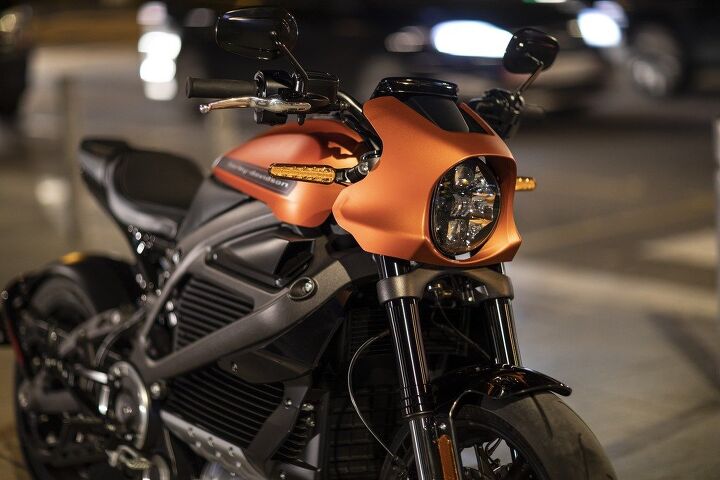#MotorcycleSales
As Harley-Davidson Sales Struggle Continues, Company Says New Product Is the Best Response
We’ve kept light tabs on Harley-Davidson over the past few years, typically to chronicle its downward progress in an effort to make parallels between it and the world’s automakers. Despite having its share of ups and downs throughout its long history, the motorcycle brand finds itself with an impressively loyal customer base willing to pay premium prices for its product.
Unfortunately, its key demographic is quickly aging out of the hobby. In response, the company turned its focus towards younger generations. While Boomers living in America remain H-D’s most important clientele, it’s seeking to branch out into other markets and age brackets. It’s also attempting to rebrand itself to achieve broader appeal without torpedoing the heritage angle that has worked so well for it in the past.
When we last checked in with Harley-Davidson, the company had just delayed its all-electric LiveWire — a bike aimed at helping the brand tap into a new market while broadcasting its ability to gaze ahead into the same vague future automakers are now struggling with. H-D has since released its Q4 earnings for 2019.
The prognosis could be better.
Indefinitely Delayed: Harley-Davidson LiveWire Update
We’ve got an addendum for our latest story on how automakers should view Harley-Davidson as a cautionary tale. The company, which recently began exploring electric motorcycles as a way to boost sales and spur public interest, recently told dealers not to expect deliveries of its newest model.
The $29,799 LiveWire that was supposed to start re-arriving this month is again delayed.
According to The Wall Street Journal, the manufacturer claims there’s an issue with the all-electric bike’s charging equipment — something that will obviously need to be addressed before it goes on sale. As a result, H-D is pulling the production plug on the two-wheeled EV.
Automakers Should Take Heed of Harley-Davidson's Marketing Failures
While not the core focus of this website, we’ve often chronicled Harley-Davidson’s missteps as a way of predicting issues that might crop up for manufacturers specializing in four-wheeled transportation.
You see, the iconically American motorcycle brand has painted itself into a corner. By leveraging its established fan base, sales swelled through the 1990s. Unfortunately, the United States’ interest in motorcycles plummeted once the Great Recession hit. H-D was not exempt, enduring the worst of it as its stock price declined 42 percent over the last five years.
As the recessional dust cleared, rival manufactures panicked and shifted away from larger bikes aimed at experienced riders with more money to spend. Japanese companies began furnishing smaller, inexpensive models they hoped would encourage new riders. Harley Davidson waited longer to do this, launching two competitively priced, entry-level models that were still larger than seemed prudent.
Despite the industry seeing slightly improved volumes in the years following 2010, the last two have seen negative growth and annual sales totalling less than half of their pre-recession peak. Hoping to find new riders somewhere, H-D again shifted tactics by building child-sized scooters and the all-electric LiveWire.
Ailing Motorcycle Industry Could Be Canary in Coal Mine for Automakers - Part Two
Last week, we discussed how the motorcycle industry’s total failure to entice new riders for over a decade has come back to bite it in the ass. Two-wheeled ownership declined drastically in the United States after the Great Recession and never really bounced back. Blame a disinterested population of youngsters with less discretionary funds and few entry-level options to consider.
I speculated that automakers could be on a similar path, despite the passenger car segment being more of a necessity for average commuters and less apt to collapse outright. But that isn’t to presume they might not be subject to similar pitfalls, and we’ve a new one to consider. Harley-Davidson, which serves as the poster child for the motorcycle industry’s current crisis, recently announced it will end all U.S. production of motorcycles sold in Europe.
Those bikes will now be manufactured overseas. The company said in a regulatory filing with the U.S. Securities and Exchange Commission that retaliatory tariffs levied by the European Union on motorcycles exported from the U.S. jumped from 6 percent to 31 percent. Harley-Davidson’s already expensive products come at an additional premium in Europe, and the the company estimates the new fines will add another $2,200 per motorcycle, on average.
Ailing Motorcycle Industry Could Be Canary in Coal Mine for Automakers
If you think car enthusiasts are a dying breed, you should take a look at motorcyclists. The two-wheeled industry is in serious trouble. A total failure in marketing occurred over the past decade. New riders aren’t coming in fast enough to replace the glut of Baby Boomers rapidly aging out of the market, and there’s a looming paranoia that self-driving vehicles could push bikes off the road entirely.
In 2017, U.S. motorcycle sales were down 11 percent, and no company was hit harder than Harley-Davidson. The brand has the oldest consumer base and has repeatedly failed at recruiting younger riders. While it builds a fine product, it’s not one that appeals to millennials. This generational cohort proved hesitant to engage in motorcycling as a pastime — a situation not helped by having less disposable income than Generation X or the Boomers did at the same stage in their lives. Young women are also poised to start out-earning young men, and few brands have successfully tapped into the female demographic.



















Recent Comments